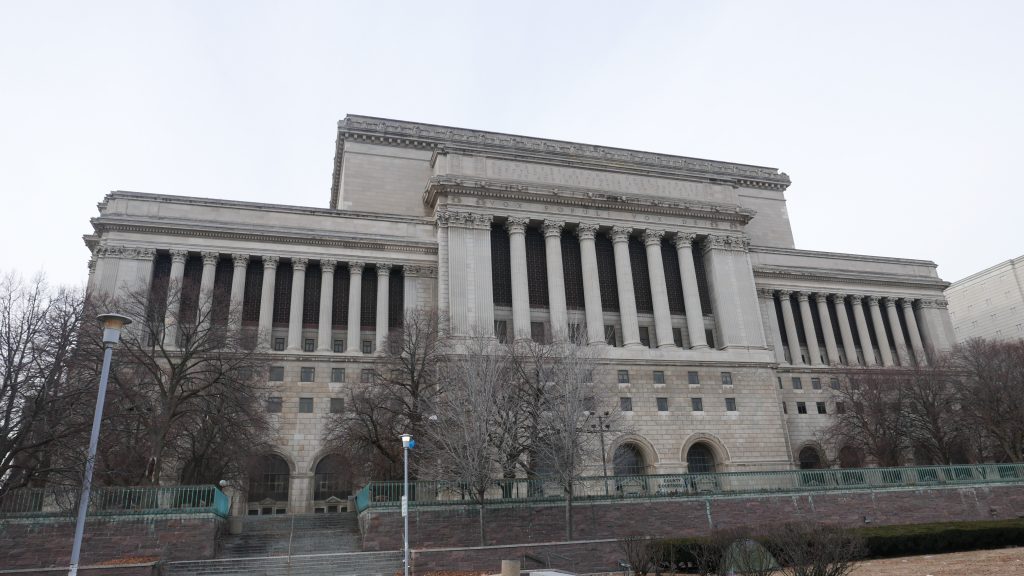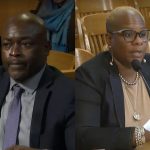Supervisors Seek to Delay Sales Tax Vote
Clancy has proposal to give supervisors "cover" to support sales tax.

Milwaukee County Courthouse. Photo by Graham Kilmer.
At the 11th hour, two Milwaukee County Supervisors who have regularly voiced opposition to raising Milwaukee County’s sales tax are proposing to delay a decision on the proposed increase.
Just 24 hours before the Milwaukee County Board is set to vote on a 0.4% countywide sales tax, Supervisor Ryan Clancy released a statement saying he and Sup. Juan Miguel Martinez want the board to delay the vote so that a new proposal for how to spend the sales tax increase can be reviewed.
“My hope is that this will give the fair number of folks on the board, and I think it’s gonna be a pretty close vote tomorrow, cover to – in two months – to be able to vote yes for the sales tax,” Clancy said in an interview.
The proposal, for which there is no formal documentation, was described by the supervisors in a press release as a plan “to allocate the initial funds generated by the proposed sales tax increase to make bus fares free for those hit hardest.” The release called for a delay in the vote “so that enable Milwaukee County research staff to thoroughly analyze potential financial impacts and allow the transit plan to be voted on alongside the sales tax increase.”
The board is scheduled to vote Thursday on the tax.
Clancy said he wanted his proposal to go through the board’s committee process before the board votes on the sales tax. The supervisor has criticized the sales tax for being regressive because the sales tax rate is the same for poor residents as it is for wealthy residents. Clancy said he’s been looking for a way to make the sales tax “less bad, but still pass it, because ultimately, we do need that additional revenue coming in in some way.” He said free bus fares would “undo a lot of harm from that regressive sales tax.”
The revenue from the sales tax increase, under Wisconsin Act 12, is restricted to paying down the county’s unfunded pension liability. The sales tax increase, according to the county’s budget office and comptroller, will generate an estimated $82 million in 2024. This will likely free up $39 million to $49 million in property tax revenue that previously was used to pay for the county’s pension costs.
The transit system faces a budget deficit of $25 million or more in 2025 when federal COVID-19 stimulus funding runs out. Without a new source of revenue, MCTS predicts it will have to eliminate half of the bus routes in the system. MCTS budgeted for approximately $23 million in farebox revenue for 2023. Eliminating fares as a source of revenue would increase the budget hole the transit system has to overcome with other revenue sources.
Clancy and Martinez are proposing that the county offset lost farebox revenue from the same pool of money that would likely be used to maintain bus routes when the stimulus money runs out in 2025: sales tax revenue.
Clancy said he can’t support the sales tax increase unless he knows how it would be spent. The county executive’s office and supervisors that support the sales tax increase have explicitly stated that the sales tax would be used to stave off draconian cuts to services like parks and transit and cuts to many of the county’s human service functions.
“I can get to a yes on the sales tax if we’re able to do something to offset the harm of that regressive sales tax,” Clancy said.
County officials have repeatedly warned that bus routes, senior centers, parks, the court system, behavioral health services and more will face budget cuts in the coming years without sales tax revenue. Non-mandated services like parks and transit would completely lose county funding support by 2028.
If the board does not approve the sales tax increase before the September deadline the soonest the county could implement a sales tax is April 1. This would cause the county to lose out on approximately $20 million in revenue in 2024.
Without his transit proposal attached to the sales tax vote, Clancy said he is a no vote. If the board delays, they could find themselves in a position where they have cost the county $20 million and, if they don’t attach his policy to the legislation, Clancy still votes no on the sales tax.
If you think stories like this are important, become a member of Urban Milwaukee and help support real, independent journalism. Plus you get some cool added benefits.
More about the Local Government Fiscal Crisis
- Mayor Johnson’s Budget Hikes Fees, Taxes In 2025, Maintains Services - Jeramey Jannene - Sep 24th, 2024
- New Milwaukee Sales Tax Collections Slow, But Comptroller Isn’t Panicking - Jeramey Jannene - Jun 28th, 2024
- Milwaukee’s Credit Rating Upgraded To A+ - Jeramey Jannene - May 13th, 2024
- City Hall: Sales Tax Helps Fire Department Add Paramedics, Fire Engine - Jeramey Jannene - Jan 8th, 2024
- New Study Analyzes Ways City, County Could Share Services, Save Money - Jeramey Jannene - Nov 17th, 2023
- New Third-Party Study Suggests How Milwaukee Could Save Millions - Jeramey Jannene - Nov 17th, 2023
- Murphy’s Law: How David Crowley Led on Sales Tax - Bruce Murphy - Aug 23rd, 2023
- MKE County: Supervisors Engage in the Great Sales Tax Debate - Graham Kilmer - Jul 28th, 2023
- MKE County: County Board Approves Sales Tax - Graham Kilmer - Jul 27th, 2023
- County Executive David Crowley Celebrates County Board Vote to Secure Fiscal Future and Preserve Critical Services for Most Vulnerable Residents - David Crowley - Jul 27th, 2023
Read more about Local Government Fiscal Crisis here
MKE County
-
Prosecution Rests Case in Dugan Trial
 Dec 17th, 2025 by Graham Kilmer
Dec 17th, 2025 by Graham Kilmer
-
Chief Judge Questioned About ICE Policy, Texts, Emails in Dugan Trial
 Dec 17th, 2025 by Graham Kilmer
Dec 17th, 2025 by Graham Kilmer
-
Fellow Judge Testifies in Dugan Case
 Dec 16th, 2025 by Graham Kilmer
Dec 16th, 2025 by Graham Kilmer






















Perhaps it is time for Mr. Clancy to concentrate on his legislative duties and resign from the county board.
Concessionary fares are fine, but free fares are a bad idea.
As we learned during the free-fare Go Card experiment some years ago, it included people who did not need relief from fares, and was abused by ineligible people who “borrowed” or otherwise acquired Go Cards. (Note: Go Cards continued in service, but they subsequently required a small “good-all-day” fare to be paid.)
Does Mr. Clancy regularly ride the bus? If he does, he would know that the new WisGo card or app allows qualifying passengers to ride all day for only $2.